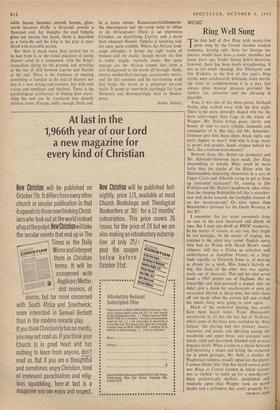MUSIC
Ring Well Sung
THE first half of Der Ring, with twenty-five parts sung by the Covent Garden resident company, leaving only three for foreign im- portees, would have been a comic shambles not many years ago. Under Georg Solti's direction, however, there has been much strengthening, if not as yet much ripening. Das Rheingold and Die Walkiire, in the first of this year's Ring cycles, were satisfactorily balanced, voice match- ing voice or complementing it in a way that always gives musical pleasure provided the timbres are attractive and the phrasing is plausible.
True, it was one of the three guests, Gerhard Stolze, who walked away with the first night. There is no more shrewdly shaped role for the born actor-singer than Loge in the whole of Wagner. Mr. Stolze brings poise, clarity and beauty of tone to every syllable, innuendo and semiquaver of it. But why did Mr. Schneider- Siemssen give him those shiny, brash tights and natty slippers to wear? And why is Loge made to prowl and ponder, hands clasped behind his back, like a noxious housemaster?
Between them, Mr. Hotter (as producer) and
Mr. Schneider-Siemssen have made Der Ring discomfiting to behold. What could be more futile than the depths of the Rhine with the Rhinemaidens disporting themselves in a sort of Upper Circle and Alberich trying to get at them up concealed staircases? Or, coming to Die Walkiire and Mr. Hotter's handiwork, what sillier than the sleeping Brilnnhilde left like a stretcher- case well down towards the footlights instead of on her mountain-top? Or what tamer than Brannhilde's entrance for the Death Warning in Act II?
I remember this last scene awesomely done on tour in the dark backward and abysm of time, But I must not dwell on BNOC memories. In the matter of visuals, at any rate, they might be too nostalgic. In the matter of singing, the contrast is the other way round. English opera then had no Wotan with David Ward's tonal richness; still less a Fricka as articulate and authoritative as Josephine Veasey; or a Sieg- linde capable, as Gwyneth Jones is, of making us dream for a week. Miss Jones's hair-do or wig, like those of the other two, was aggres- sively out of character. This and her nice gown made a 1965 poppet out of Sieglinde. But so irresistible and high-powered a poppet that we didn't give a damn for anachronism or even an occasional blurted or sharp note, but went clean off our heads when the curtain fell and wished the whole thing were going to start again.
Much of the orchestral playing, too, could have been heard twice. From Rheingold's curtain-rise to all but the last lap of Walkiire, where some of the brass were overtaken by 'Ring fatigue,' the playing had two primary assets: expansive and poetic solo phrasing among the woodwind and upper brass; and sectional tone which, solid and burnished,' blended well at most dynamic levels. When it came to a choice between half-drowning a singer and letting the orchestra rip in plum passages, Mr. Solti, a reveller in Wagnerian richness, usually opted for the plums. I cannot blame him. One has heard several post- war Rings at Covent Garden in which volume was so curbed—to make up for a non-Bayreu- thian orchestra-pit, shallow, unshielded and relatively open—that Wagner took on pastel shades and a politeness that aren't properly his.
CHARLES REID






































 Previous page
Previous page